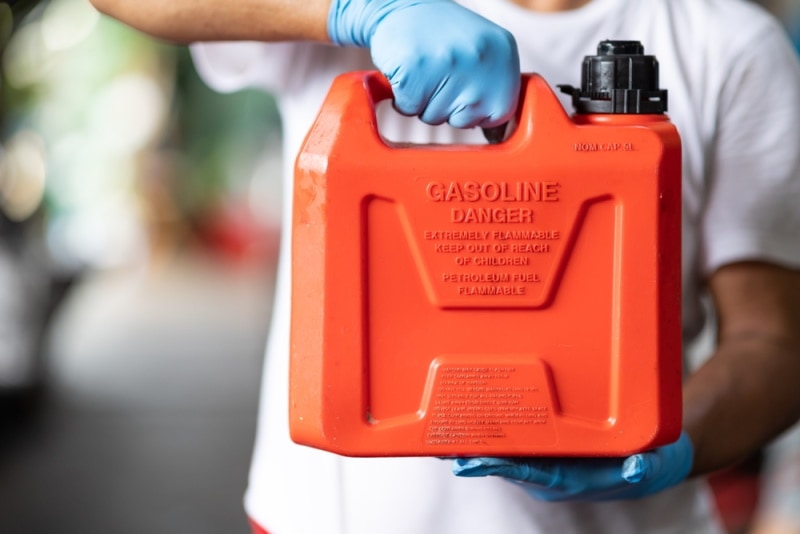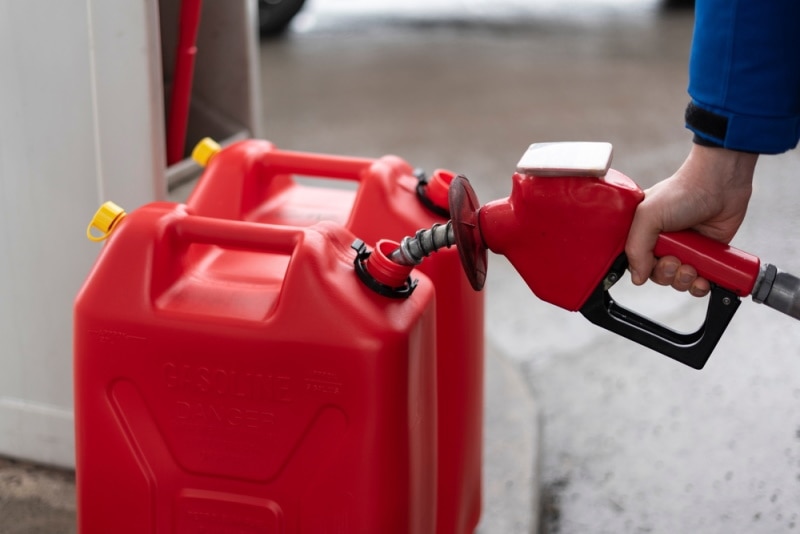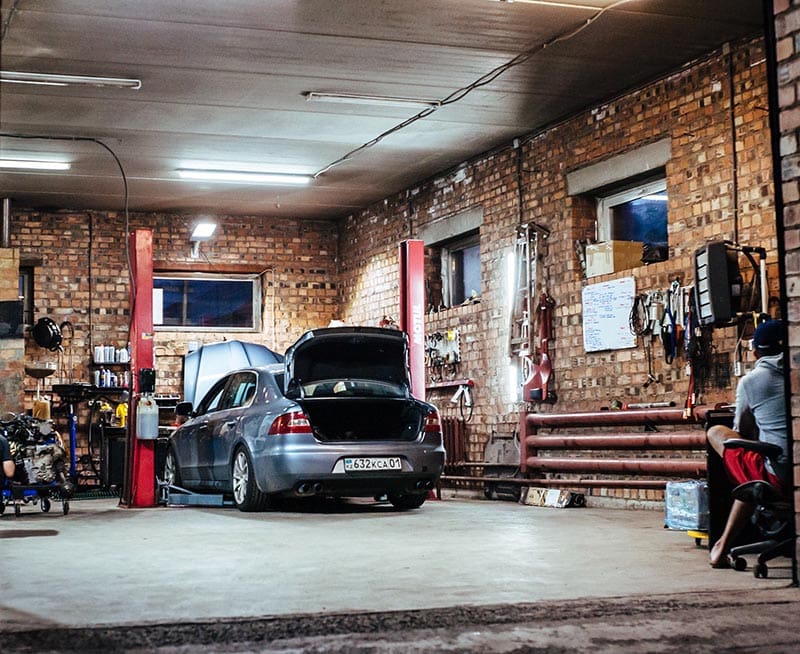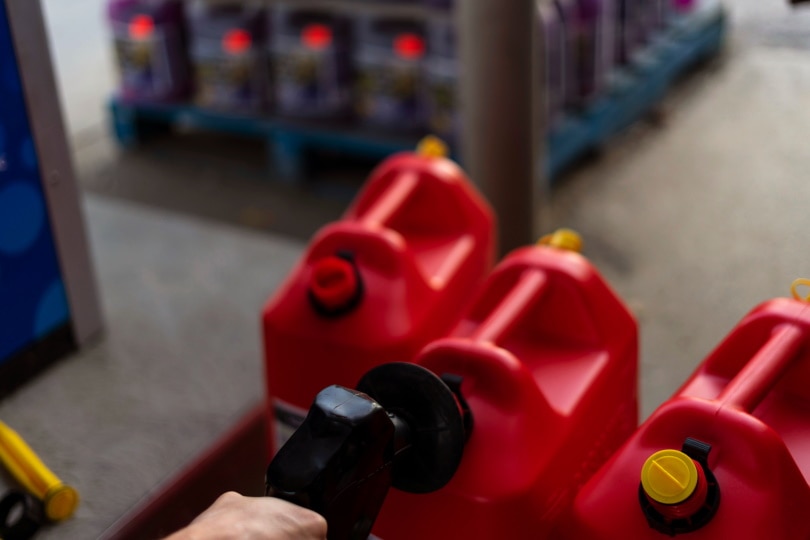How to Properly Store Gasoline – 8 Expert Safety Tips
-
Kristin Hitchcock
- Last updated:

There are all sorts of reasons for storing gasoline. You may have a generator that runs on gas, or you may simply want to put some away in case of emergencies. While you obviously need gas to run your car, many power lawnmowers and outdoor tools also require it to run. Therefore, it isn’t odd to have a couple of gallons stocked away in the event that one of these tools needs more fuel.
However, gasoline is combustible and can be dangerous if stored improperly, so it is vital that you store it properly and take all of the necessary precautions. Where and how you exactly store your gasoline depends on many factors, such as how long you’re storing it and your home’s layout.
The 8 Tips on How to Properly Store Gasoline
1. Check Local Regulations
Many areas have regulations on the storage of gasoline. These regulations are to prevent serious accidents from occurring since gasoline can be pretty dangerous. Fire codes typically restrict the amount of gasoline you can store at home. It may also restrict the containers you’re able to use.
Often, these regulations require you to use best practices when storing gasoline (which you should be doing anyway). If you’re doing everything right, you often don’t have anything to worry about. However, it’s still a good idea to check and ensure that you’re following all the necessary regulations.
2. Containers
You must store gasoline in an approved container. Not just any container will do. Gasoline can be mildly corrosive. Therefore, when left in a container for years, it can corrode tiny holes and lead to spills. Approved containers are designed to store gasoline specifically and are often strong enough to avoid this corrosion.
You should keep the containers tightly closed and check the lids regularly. Spills are one of the most common causes of accidents relating to gasoline. Choosing high-quality containers can help a lot with this.

3. Store Away from Heat
First and foremost, it’s important to remember that gasoline is flammable. Therefore, it will catch fire if kept near a heat source. It’s recommended to store gasoline in a dark area that stays around room temperature. Be careful not to store gasoline near a hot water heater, furnace, or space heater. Anything that makes heat should be kept at least 50 feet away from the gasoline.
Furthermore, remember that the sun can heat up containers. Don’t store gasoline by a window, as the sun can heat up the gasoline to unsafe levels. Plus, the UV light from the sun can damage the container, leading to spills over time.
Gasoline vapors are heavier than air and the flammable vapors will fall to the floor. Keep this in mind whenever you’re working in the area. It is best not to smoke or use any heat sources near the gasoline storage area.
4. Store Gasoline Away from the Living Area
You should store gasoline away from the living area. You don’t want you or your family regularly exposed to toxic fumes. It is best to store the gasoline in a shed or outbuilding where you don’t regularly hang out. The next best place is a basement or garage.
Of course, do keep in mind that most garages can get hot in the summer, especially if you have windows in the garage.

5. Only Use Gasoline in Cool Engines
Do not use gasoline in motors that are already warm. Let the lawnmower or car engine cool completely before refilling it with gasoline. It’s best to handle the gasoline outdoors, as well. The increased ventilation is better for your health, and the ventilation prevents the chance of the fumes catching fire.
6. Do Not Mix Gasoline with Kerosene or Diesel
You cannot use gasoline in any devices that require the use of kerosene or diesel. In many cases, this will simply damage the piece of equipment. However, in other cases, it can be dangerous. Gasoline should only be used by itself as directed in the user manual of the piece of equipment you’re utilizing.

7. Clean Up Spills Promptly
You should clean up any spills quickly. You can utilize sawdust, paper, and rags to clean up minor spills. Be sure to dispose of the items used for cleaning quickly and safely. This often counts as toxic, so you’ll need to dispose of it according to your area’s regulations.
For larger spills, you’ll need to contain and collect the gasoline. The idea is to stop the spill as quickly as possible, prevent it from spreading, and then clean it up.
You should not dispose of gasoline in the garbage, toilets, sewers, or drains. It can seep into the ground, causing fires and polluting the surrounding area. Many areas have strict regulations on handling gasoline for these reasons. It is a dangerous chemical and should be treated as such.
8. Be Mindful of Storage Dates
Regular gasoline can be stored for up to 6 months. However, some may go bad in as little as 3 months, depending on the gasoline and quality of the container. Where you store the gasoline is also important. That’s why we recommend storing it away from sunlight and in a place with an even temperature. Very hot or very cold temperatures can degrade gasoline faster (and cause it to catch on fire).
Organic, ethanol-based gasoline can lose its combustion properties in only 1–3 months. It oxidizes and evaporates faster, which makes it usable for a shorter period.
Write the date of storage on the container of the gasoline you’re storing. Then, be sure to check the date before using it. You don’t want to use old fuel, as it may not work very well in the least.

Conclusion
Storing gasoline isn’t hard, but it can be a bit complicated. You’ll need an area that doesn’t get too hot or too cold. There shouldn’t be any windows or heat sources nearby, as this can cause the gasoline to catch on fire. It is very dangerous, which is why it needs to be stored so carefully.
The type of container you use also matters. You should only store it in a container that is approved by the Department of Transportation, as gasoline is slightly corrosive.
Featured Image Credit: Quality Stock Arts, Shutterstock
Contents
